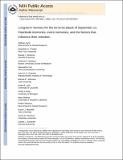| dc.contributor.author | Hirst, William | |
| dc.contributor.author | Phelps, Elizabeth A. | |
| dc.contributor.author | Buckner, Randy L. | |
| dc.contributor.author | Budson, Andrew E. | |
| dc.contributor.author | Cuc, Alexandru | |
| dc.contributor.author | Johnson, Marcia K. | |
| dc.contributor.author | Lyle, Keith B. | |
| dc.contributor.author | Lustig, Cindy | |
| dc.contributor.author | Mather, Mara | |
| dc.contributor.author | Meksin, Robert | |
| dc.contributor.author | Mitchell, Karen J. | |
| dc.contributor.author | Ochsner, Kevin N. | |
| dc.contributor.author | Schacter, Daniel L. | |
| dc.contributor.author | Gabrieli, John D. E. | |
| dc.date.accessioned | 2012-03-30T21:11:28Z | |
| dc.date.available | 2012-03-30T21:11:28Z | |
| dc.date.issued | 2010-08 | |
| dc.identifier.issn | 0096-3445 | |
| dc.identifier.issn | 1939-2222 | |
| dc.identifier.uri | http://hdl.handle.net/1721.1/69909 | |
| dc.description.abstract | More than 3,000 individuals from 7 U.S. cities reported on their memories of learning of the terrorist attacks of September 11, as well as details about the attack, 1 week, 11 months, and/or 35 months after the assault. Some studies of flashbulb memories examining long-term retention show slowing in the rate of forgetting after a year, whereas others demonstrate accelerated forgetting. This article indicates that (a) the rate of forgetting for flashbulb memories and event memory (memory for details about the event itself) slows after a year, (b) the strong emotional reactions elicited by flashbulb events are remembered poorly, worse than nonemotional features such as where and from whom one learned of the attack, and (c) the content of flashbulb and event memories stabilizes after a year. The results are discussed in terms of community memory practices. | en_US |
| dc.description.sponsorship | James S. McDonnell Foundation | en_US |
| dc.description.sponsorship | National Institutes of Health (U.S.) (grant R01- MH0066972) | en_US |
| dc.language.iso | en_US | |
| dc.publisher | American Psychological Association (APA) | en_US |
| dc.relation.isversionof | http://dx.doi.org/10.1037/a0015527 | en_US |
| dc.rights | Creative Commons Attribution-Noncommercial-Share Alike 3.0 | en_US |
| dc.rights.uri | http://creativecommons.org/licenses/by-nc-sa/3.0/ | en_US |
| dc.source | PubMed Central | en_US |
| dc.title | Long-Term Memory for the Terrorist Attack of September 11: Flashbulb Memories, Event Memories, and the Factors That Influence Their Retention | en_US |
| dc.type | Article | en_US |
| dc.identifier.citation | Hirst, William et al. “Long-term Memory for the Terrorist Attack of September 11: Flashbulb Memories, Event Memories, and the Factors That Influence Their Retention.” Journal of Experimental Psychology: General 138.2 (2009): 161–176. Web. 30 Mar. 2012. | en_US |
| dc.contributor.department | Massachusetts Institute of Technology. Department of Brain and Cognitive Sciences | en_US |
| dc.contributor.approver | Gabrieli, John D. E. | |
| dc.contributor.mitauthor | Gabrieli, John D. E. | |
| dc.relation.journal | Journal of Experimental Psychology General | en_US |
| dc.eprint.version | Author's final manuscript | en_US |
| dc.type.uri | http://purl.org/eprint/type/JournalArticle | en_US |
| eprint.status | http://purl.org/eprint/status/PeerReviewed | en_US |
| dspace.orderedauthors | Hirst, William; Phelps, Elizabeth A.; Buckner, Randy L.; Budson, Andrew E.; Cuc, Alexandru; Gabrieli, John D. E.; Johnson, Marcia K.; Lustig, Cindy; Lyle, Keith B.; Mather, Mara; Meksin, Robert; Mitchell, Karen J.; Ochsner, Kevin N.; Schacter, Daniel L.; Simons, Jon S.; Vaidya, Chandan J. | en |
| dc.identifier.orcid | https://orcid.org/0000-0003-1158-5692 | |
| mit.license | OPEN_ACCESS_POLICY | en_US |
| mit.metadata.status | Complete | |
